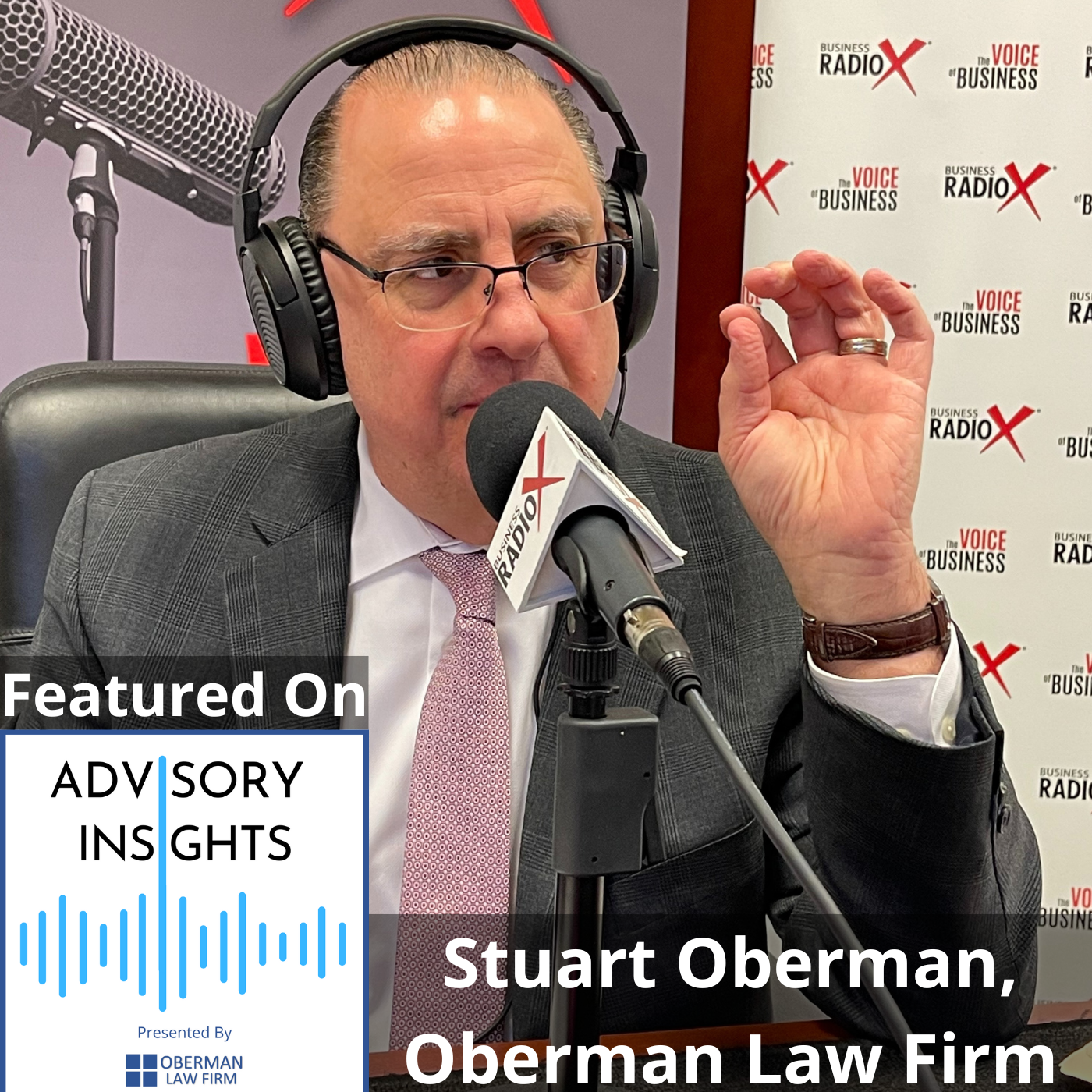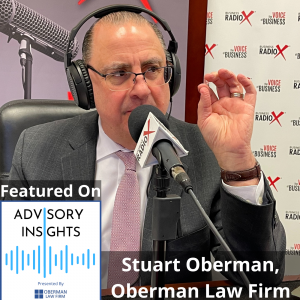
IRS Employee or Independent Contractor Classification (Advisory Insights, Episode 39)
On this episode of Advisory Insights, Stuart Oberman of Oberman Law Firm discussed the IRS’s Independent Contractor Test and how it can be used to determine the status of workers. He also explained that there is a presumption that independent contractors are employees in most states, how that can be overcome, and much more.
Advisory Insights is presented by Oberman Law Firm and produced by the North Fulton studio of Business RadioX®. The series can be found on all the major podcast apps. You can find the complete show archive here.
TRANSCRIPT
Intro: [00:00:01] Broadcasting from the studios of Business RadioX, it’s time for Advisory Insights. Brought to you by Oberman Law Firm, serving clients nationwide with tailored service and exceptional results. Now, here’s your host.
Stuart Oberman: [00:00:20] And welcome everyone to Advisory Insights. Stuart Oberman here, your host. All right, folks, we’re going to talk a little bit about IRS, the government. So, today’s topic, IRS: Employee or Independent Contractor Classifications.
Stuart Oberman: [00:00:37] I can’t tell you how many times I get this request for information on a weekly basis, hot topics during speeches. But I want to run through some basics as to whether or not you are on the professional side doing working interviews – which is a no-no – or you are right on the edge of that employee contractor relationship, or you know it should be employee but you don’t want to pay taxes on that person, or whether that person just wants to be either an employee or independent contractor.
Stuart Oberman: [00:01:13] But I want to pass the test in case you’re audited. I want to write out some clear guidelines as to what you need to look at to determine if that particular person is either an employee or independent contractor. So, the IRS has numerous, numerous things they look at, but I want to drill it down to the simplest form. Because there’s always variations., the economic test, the reality test, and need tests, there’s 20 million tests, but they all come back to the same thing, and I want to work on these scenarios.
Stuart Oberman: [00:01:52] So, there’s three things the IRS look at. I don’t care what the FTC has put out, what the government has put out on advisories, they’re looking at three things. Behavioral. Does the company control behavior? Do they have the right to control the worker? How does the worker do the job? Test one.
Stuart Oberman: [00:02:18] Test two. Financial control. Does the business have direct or control of the finances and the business aspects of the worker’s job? Finances, how are they paid? Economically, what’s the schedule? Are expenses reimbursed? Are tools or supplies provided?
Stuart Oberman: [00:02:46] Test three. Relationship of the parties. Is there a written contract? Benefits. I often sort of chuckle when I see independent contractors’ agreements coming to our office that are written by the business owner, and every phrase in that agreement, although it’s supposed to be an independent contractor agreement, says employee. How can you have an independent contractor agreement and everything in that agreement says employee, employee? And then, the employee is getting benefits, insurance, vacation pay. Folks, that’s not an independent contractor. There’s certain wording you need to look at and employee is not one of them in those contracts.
Stuart Oberman: [00:03:41] So, that’s a three part test. Behavior control, financial control, relationship of the parties.
Stuart Oberman: [00:03:49] Now, I want to drill this down just a little bit more. Well, in Georgia or Florida or Mississippi or Kansas, each state has their own requirements as to what they also think is an independent contractor. And most of the time, the State Department of Revenue departments are much more vindictive and aggressive than the IRS. So, each state has different laws, rules, criterias, and you have to know what those are in addition to what the IRS overview is.
Stuart Oberman: [00:04:36] So, I want to take a look at a couple of historical things for you guys to consider with independent contractors. First and foremost, what’s the control an employer exercises over the individual? Does the individual provide services for other clients, other companies? Or is that “independent contractor” the only person that works for you? If they are, potential problem. If they’re working with five other companies, two other companies, and they’re not necessarily economically dependent on you, your criteria gets a little bit better.
Stuart Oberman: [00:05:25] The level of education and training. What is the training of that particular person as an independent contractor? Generally, someone who is of a professional degree, CPA, attorney, what have you, architect will probably have a little bit more leeway as to whether or not they’re an independent contractor because of their education and training.
Stuart Oberman: [00:05:55] So, I want to look at tools, equipment. Is that person coming to your office? Is that person coming to your job site? Is that person working in your warehouse? Are you providing the backhoes? Are you providing the trucks, equipment, bobcats, whatever it is?
Stuart Oberman: [00:06:16] The timing of the performance. Are you telling them, “John, Mary, I want you there at 9:00 to 5:00. I want you there at 8:30 to 5:00. You get an hour lunch or half hour lunch and then you’re back to work.” Are you going to punch in? Are you going to punch out?
Stuart Oberman: [00:06:32] And I may or may not pay you overtime, I don’t know. But because you’re an independent contractor, I may or may not pay you overtime. I don’t care if you work 60 hours a week. You’re an independent contractor, I’m paying you $100 a week and that’s all. You need to look at that really, really close. Are they hour-based requirements or are they project-based – project? Or is it performance and service-based?
Stuart Oberman: [00:07:02] Agreement. Is there an agreement between the parties? Is there a contract? If not, you need one. The length of time. You’re going to be an independent contractor for three days, you’re going to be an independent contractor for three years, not so much. Is the term open-ended? Are the terms of the contract open-ended?
Stuart Oberman: [00:07:29] And then, one of the things that I always look at, is, how essential is that person to your continued operation of the business? If they are absolutely critical to your infrastructure, your revenue, your ongoing process, it’s going to be an employee. You got to look at that. So, the less control you have over that person, the better off you’re going to be. Now, the more control, obviously, you’re going to be closer to an employee status.
Stuart Oberman: [00:08:06] Now, the IRS has listed out 20 factors, 20 factors. At some point, every independent contractor is going to hit at least one of those factors. I don’t care what it is. They’re going to hit something. You’ve got to take a look at, “Okay. John and Mary is coming in as independent contractor.” Do they pass or how much of that test of the 20 factors do they pass what the IRS put out?
Stuart Oberman: [00:08:36] I believe it was in 1987, so this is nothing earth shattering. They revised it. Things come in. Things come out. But you look at the guts of it, the three factors. You look at the control, the financial and relationship, you look at those 20 factors, and then you have to determine the statuses of the parties.
Stuart Oberman: [00:08:57] Folks, that’s a long, long 20 explanation matter. But, again, keep it basics. We’re going to have tweaks. We’re going to have three or four parts or test or whatever it is. The bottom line is, is that the courts are going to decide whatever they want to decide, the IRS is going to decide whatever they want to decide, and so is the State Department of Revenues, but you got to have a background.
Stuart Oberman: [00:09:23] There’s a presumption, presumption in most states that an independent contractor is an employee. Presumption. Overcome it. Overcome that obstacle if you wanted to. Folks, that’s the IRS in its simplest.
Stuart Oberman: [00:09:39] Advisory Insights. Thanks for joining us today. Feel free to reach out, phone number 770-886-2400, or email me, stuart, S-T-U-A-R-T, @obermanlaw.com. Thanks, folks. Have a fantastic day.
Outro: [00:09:57] Thank you for joining us on Advisory Insights. This show is brought to you by Oberman Law Firm, a business-centric law firm representing local, regional, and national clients in a wide range of practice areas, including health care, mergers and acquisitions, corporate transactions, and regulatory compliance.
About Advisory Insights Podcast
Presented by Oberman Law Firm, Advisory Insights Podcast covers legal, business, HR, and other topics of vital concern to healthcare practices and other business owners. This show series can be found here as well as on all the major podcast apps.
Stuart Oberman, Oberman Law Firm

Stuart Oberman is the founder and President of Oberman Law Firm. Mr. Oberman graduated from Urbana University and received his law degree from John Marshall Law School. Mr. Oberman has been practicing law for over 25 years, and before going into private practice, Mr. Oberman was in-house counsel for a Fortune 500 Company. Mr. Oberman is widely regarded as the go-to attorney in the area of Dental Law, which includes DSO formation, corporate business structures, mergers and acquisitions, regulatory compliance, advertising regulations, HIPAA, Compliance, and employment law regulations that affect dental practices.
In addition, Mr. Oberman’s expertise in the healthcare industry includes advising clients in the complex regulatory landscape as it relates to telehealth and telemedicine, including compliance with corporate structures, third-party reimbursement, contract negotiations, technology, healthcare fraud, and abuse law (Anti-Kickback Statute and the State Law), professional liability risk management, federal and state regulations.
As the long-term care industry evolves, Mr. Oberman has the knowledge and experience to guide clients in the long-term care sector with respect to corporate and regulatory matters, assisted living facilities, and continuing care retirement communities (CCRCs). In addition, Mr. Oberman’s practice also focuses on healthcare facility acquisitions and other changes of ownership, as well as related licensure and Medicare/Medicaid certification matters, CCRC registrations, long-term care/skilled nursing facility management, operating agreements, assisted living licensure matters, and health care joint ventures.
In addition to his expertise in the healthcare industry, Mr. Oberman has a nationwide practice that focuses on all facets of contractual disputes, including corporate governance, fiduciary duty, trade secrets, unfair competition, covenants not to compete, trademark and copyright infringement, fraud, and deceptive trade practices, and other business-related matters. Mr. Oberman also represents clients throughout the United States in a wide range of practice areas, including mergers & acquisitions, partnership agreements, commercial real estate, entity formation, employment law, commercial leasing, intellectual property, and HIPAA/OSHA compliance.
Mr. Oberman is a national lecturer and has published articles in the U.S. and Canada.
Oberman Law Firm
Oberman Law Firm has a long history of civic service, noted national, regional, and local clients, and stands among the Southeast’s eminent and fast-growing full-service law firms. Oberman Law Firm’s areas of practice include Business Planning, Commercial & Technology Transactions, Corporate, Employment & Labor, Estate Planning, Health Care, Intellectual Property, Litigation, Privacy & Data Security, and Real Estate.
By meeting their client’s goals and becoming a trusted partner and advocate for our clients, their attorneys are recognized as legal go-getters who provide value-added service. Their attorneys understand that in a rapidly changing legal market, clients have new expectations, constantly evolving choices, and operate in an environment of heightened reputational and commercial risk.
Oberman Law Firm’s strength is its ability to solve complex legal problems by collaborating across borders and practice areas.
Connect with Oberman Law Firm:
Company website | LinkedIn | Twitter
















